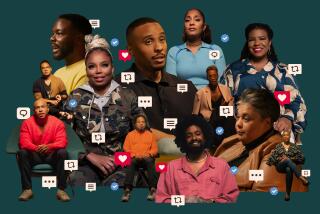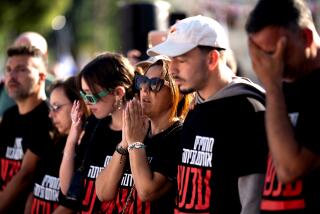Twitter at heart of ABC’s marketing campaign for Thursday lineup
Television heroine Olivia Pope is known as “the fixer” in the nation’s capital.
She has stopped kidnappers targeting politicians’ kids, saved the president’s chief of staff from a sex scandal and covered up murders. But what fans of the hit “Scandal” don’t know is that the actress who plays Pope, Kerry Washington, might have helped fix ABC’s strategy for promoting the show.
Washington made a suggestion to creator Shonda Rhimes when “Scandal” debuted in 2012: Get the cast to religiously use Twitter to generate buzz. Rhimes quickly sent out an email to her tightknit crew to crank up the social media.
“She totally Olivia Poped the situation,” recalled Darby Stanchfield, who plays press secretary Abby Whelan on the show. “Most of us weren’t on social media at all, but we agreed to do it.”
A phenomenon was born that got the attention of the network’s top brass and Hollywood’s television industry.
“Scandal” is one of the most talked-about shows on social media, with fans — known as “Gladiators” — sending out more than 3 million tweets this season. ABC used this fervor to market Rhimes’ other Thursday night programs: “Grey’s Anatomy” and “How to Get Away With Murder.”
ABC even branded the Thursday night lineup as “#TGIT” or “Thank God It’s Thursday,” which the network considers to be one giant social media party. With Twitter at the core of its marketing campaign, ABC dominated fall Thursday night Nielsen TV ratings week after week while engaging TV viewers in online conversations.
“It proves the more [networks] can engage with the consumer and create a passionate loyal viewer base, the better the ratings are going to be for the show,” said Jackie Kulesza, a senior vice president at the media buying firm Starcom. “Social media hypes the excitement and really drives a desire to watch the program.”
Thursday night is a key night of the week because advertisers, including Hollywood studios and car companies, pay a premium for commercial spots to try to influence weekend spending.
ABC has done well on Thursday nights for several years, but this year the network has found momentum throughout the week.Its new crop of shows was stronger this year, enabling the network to pair strong shows with promising newcomers.
So now “Scandal” runs with “How to Get Away With Murder” on Thursday, and “Blackish” is paired with “Modern Family” on Wednesday. The strategy paid off, pulling the network out of a three-year spell in fourth place in the advertiser-preferred 18- to 49-year-old demographic.
As of mid-November, ABC was ranked first in that key audience demographic among the broadcast networks, with CBS and NBC tied for second place.
Even opposite the tougher competition — namely CBS’ “Thursday Night Football” during the first five weeks of the season — ABC surged 28% in total viewers compared with its year-ago averages. It is also up 21% in the key demo on the night versus the same point last year. The network delivered its strongest Thursday start to a season in five years, since the 2009-10 fall season.
“For the longest time the 8 o’clock hour was a challenge for us in getting something to stick … but then we put ‘Grey’s’ there,” said Marla Provencio, ABC Entertainment Group’s executive vice president of marketing. “TGIT showed that people can come to one show and stay the whole night if there is something that has a true natural flow.”
There is no way to make a direct correlation between the number of tweets a television show has and its effect on overall ratings. But there is some evidence that TV is a huge topic.
Twitter issued a report in May that found 85% of people tweeting during prime-time hours are talking about television shows. The social media giant also found that when stars of the show live-tweeted during a premiere, there were 64% more tweets that day compared with the programs that didn’t have talent involved.
So it’s natural that networks and casts of shows are increasingly looking to social media as a tool to connect with fans and generate buzz. Twitter has about a dozen employees working directly with TV networks and talent teams in the U.S. Their main focus is to help teach people how they can increase the volume of tweets and engage fans.
For example, the cast of “Scandal” and Rhimes came up with the show’s live-tweeting campaign on their own, but Twitter armed them with tips and tricks to help their tweets get seen by more people. Twitter also recently partnered with ABC to throw a party for the casts of the TGIT shows.
“TGIT led the charge,” said Lara Cohen, Twitter’s director of talent. “The shows definitely set the gold standard.”
The surge of social media posts about television has even created business opportunities for companies willing to analyze all the data. Mashwork, a New York-based social media insights firm, created a platform called Canvs to parse through all tweets about TV shows.
The company uses relevant tweets from three hours before, during and three hours after an episode’s initial broadcast, local time, to gauge what emotions people have about TV. They break down the tweets into “reactions,” which they define as tweets that contain any kind of emotion — everything from “love” to “crazy.”
Over the course of the season, the three TGIT shows combined have amassed 1.3 million “reactions” out of 5.2 million tweets, according to Canvs data.
The hashtag #TGIT has been mentioned in 863,680 tweets (17% of all total tweets) and 204,510 reaction tweets (16%) over the course of the season.
But even more surprising, there is also a big overlap of fan tweets about the shows, suggesting that viewers stick around to watch more than just one of the Thursday lineup. For instance, #Scandal was mentioned in 6% of “How to Get Away With Murder” reactions, meaning that people were reacting to both shows at once.
“Scandal” is the biggest show of the three in terms of reactions and total tweets. Over the course of nine episodes, the drama inspired 737,130 reactions out of 3.1 million tweets. Its premiere alone racked up 718,000 tweets.
By comparison, the season four premiere of FX’s “American Horror Story” — another show that has embraced live-tweeting from cast members — drove 1 million tweets in its Wednesday time slot, according to Nielsen.
For Camilla Luddington, who plays Dr. Jo Wilson on “Grey’s Anatomy,” live-tweeting #TGIT has become a way to watch alongside fans. She’s amassed 216,000 followers since joining Twitter in 2011.
“The only time I won’t live-tweet the show is when I’m driving,” she said. “But for the most part I won’t make any plans on a Thursday night.”
Matt McGorry, who plays Asher Millstone on “How to Get Away With Murder,” is equally addicted. McGorry now almost always live-tweets episodes of the show.
“Live-tweeting is a fun thing that I’ve always wanted to do, but on a Netflix show I couldn’t really do it because people watch at their own pace,” said McGorry, who also stars in Netflix’s “Orange Is the New Black.”
The actor, who has 174,000 followers on Twitter, sees the platform as a way to connect with fans, often using a bit of sarcasm and humor in his tweets. That’s exactly the kind of interaction and engagement ABC hoped would come from TGIT.
McGorry is so passionate about tweeting that he once set his alarm to 4 a.m. while on vacation in Italy just so he could tweet along.
“It’s really important to me,” he said. “So I set my alarm, woke up to live-tweet for like an hour and then went back to sleep.”
More to Read
From the Oscars to the Emmys.
Get the Envelope newsletter for exclusive awards season coverage, behind-the-scenes stories from the Envelope podcast and columnist Glenn Whipp’s must-read analysis.
You may occasionally receive promotional content from the Los Angeles Times.







